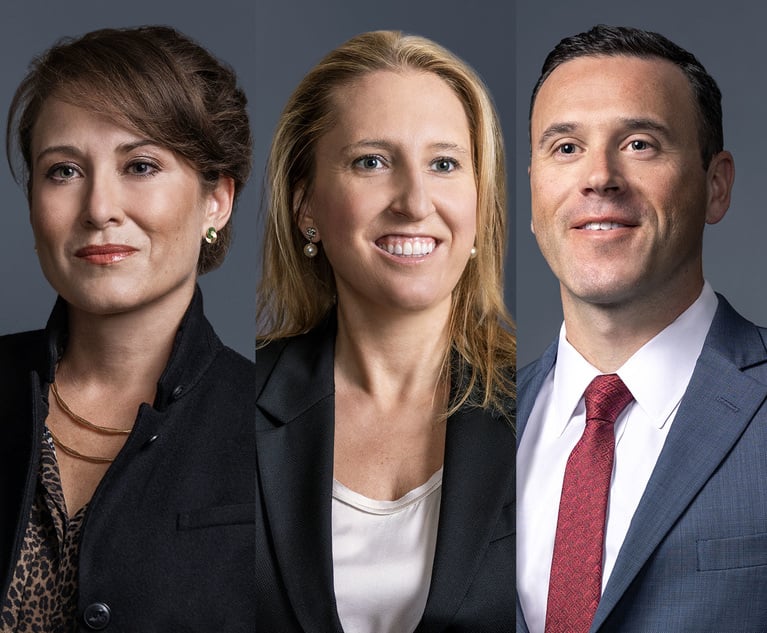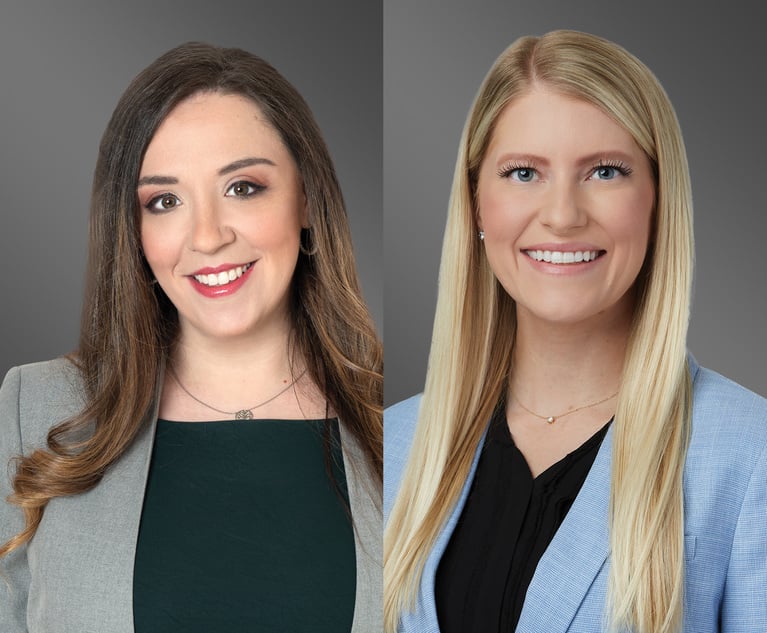The New Reality of PFAS Liability in California
Under Proposition 65, companies doing business in California with 10 or more employees are now required to provide a “clear and reasonable” warning before exposing anyone to products with perfluorooctanoic acid and perfluorooctane sulfonate.
November 20, 2018 at 05:39 PM
5 minute read
 Left to right: Jeffrey Dintzer and Nathaniel Johnson of Alston & Bird.
Left to right: Jeffrey Dintzer and Nathaniel Johnson of Alston & Bird.
Perhaps lost amid the political activity of election week, an important set of regulations became enforceable in California on Nov. 10, 2018, under Proposition 65. From that Saturday forward, companies doing business in California with 10 or more employees are required to provide a “clear and reasonable” warning before exposing anyone to products with perfluorooctanoic acid (PFOA) and perfluorooctane sulfonate (PFOS). Liability under Proposition 65 can multiply rapidly and viably threaten statewide business operations in California. Despite that risk, the state regulator—the California Office of Environmental Health Hazard Assessment (OEHHA)—has yet to offer any guidance on how businesses can avoid liability.
PFOA and PFOS are two of the most common forms of the emerging contaminant known as perfluoroalkyl and polyfluoroalkyl substances (PFAS). Recently, PFAS have caught the attention of regulators and litigants throughout the country. This ubiquitous collection of chemicals has been utilized in myriad industries for decades, ranging from paper manufacture to wastewater treatment to firefighting at industrial facilities. Some measure of PFAS can be found in every person in the U.S. These compounds are incredibly persistent and provide a remarkably difficult remediation challenge.
While regulators and litigants are testing numerous PFAS, PFOA and PFOS have been at the top of the list. For example, in May 2016, the U.S. Environmental Protection Agency (EPA) set “Health Advisory” levels of PFOA and PFOS at a combined 70 parts per trillion in drinking water. Earlier this year, among other actions devoted to PFAS regulation, the EPA announced it would initiate the process to designate PFOA and PFOS as “hazardous substances” under federal law and consider a “maximum contaminant level” for PFOA and PFOS in drinking water.
California has taken things even further. On Nov. 10, 2017, the OEHHA added PFOA and PFOS to “the list of chemicals known to the state to cause reproductive toxicity (developmental endpoint) for purposes of Proposition 65.” When it did so, the OEHHA invoked the “authoritative bodies” mechanism by relying on EPA findings. Yet the OEHHA has not set any maximum allowable dose levels or identified any specific route of exposure, even though the EPA itself limited its unenforceable Health Advisory to a combined 70 parts per trillion for PFOA and PFOS in drinking water. The OEHHA said that it expects to complete drinking water standards “later this year.” But the end of the year is fast approaching, and even if the OEHHA releases drinking water standards, every other business subject to the warning requirement will still be left in the dark.
The OEHHA has magnified the confusion by declaring that it “remains the responsibility” of regulated parties “to determine if a warning is necessary or a discharge is prohibited.” The agency has not even said whether it will impose legacy warning requirements for products that contained PFOA and PFOS before the chemicals were listed. For those products—such as carpeting installed decades prior—the potential exposures to PFOA and PFOS may continue to the present, even though the product was installed long ago.
Unfortunately, liability under Proposition 65 does not depend on regulatory clarity from the OEHHA. Civil penalties based on Proposition 65 violations can reach up to $2,500 per violation per day. Proposition 65 provides liberal private enforcement mechanisms and can incentivize lawsuits through attorneys' fees awards. In the case of PFOA and PFOS, litigation is likely on the short-term horizon. Regulators of all stripes have already undertaken substantial testing of public water supplies in California for PFAS-related compounds, which could support aggressive Proposition 65 claims. As the state's coffee retailers can attest, Proposition 65 liabilities can quickly snowball out of control.
The reality of PFAS liability has come to California. Proposition 65 liability complements an ever-expanding variety of regulation and litigation concerning PFAS. State regulators across the country are employing enforceable standards for PFAS use and contamination. Thousands of plaintiffs are already pursuing legal claims under federal environmental statutes and the traditional toxic tort rubric. These regulatory and legal elements portend a difficult economic future for any business that has potentially used PFAS, especially in California.
Despite the risk, there are still steps your business can take now to stave off potentially significant PFAS-related liabilities. At the outset, you should hire counsel to work with a qualified environmental consultant to conduct an audit of the risk PFAS pose to your business. Besides any legal and practical expertise counsel can provide, beginning by hiring counsel carries a major benefit: your PFAS audit can be cloaked in attorney-client privilege and attorney work product confidentiality.
With a comprehensive (and confidential) audit in hand, you can begin taking preventive actions to protect your business. In addition, you will be ideally situated to press regulators and litigants on their PFAS claims, especially concerning whether specific PFAS exposures caused particular alleged injuries.
Alston & Bird partner Jeffrey Dintzer has nearly 30 years experience representing clients in complex environmental, toxic tort, and land use litigation, class actions, and administrative proceedings. Senior associate Nathaniel Johnson handles matters involving potentially significant environmental liabilities, ranging from high-stakes oil and gas litigation to complex land use disputes and expansive environmental contamination claims.
This content has been archived. It is available through our partners, LexisNexis® and Bloomberg Law.
To view this content, please continue to their sites.
Not a Lexis Subscriber?
Subscribe Now
Not a Bloomberg Law Subscriber?
Subscribe Now
NOT FOR REPRINT
© 2025 ALM Global, LLC, All Rights Reserved. Request academic re-use from www.copyright.com. All other uses, submit a request to [email protected]. For more information visit Asset & Logo Licensing.
You Might Like
View All
M&A Transactions and AB 1824: Navigating New Privacy Compliance Challenges
7 minute read
What Will It Mean in California if New Federal Anti-SLAPP Legislation Passes?
9 minute read
Courts Demonstrate Growing Willingness to Sanction Courtroom Misuse of AI
4 minute readTrending Stories
- 1Uber Files RICO Suit Against Plaintiff-Side Firms Alleging Fraudulent Injury Claims
- 2The Law Firm Disrupted: Scrutinizing the Elephant More Than the Mouse
- 3Inherent Diminished Value Damages Unavailable to 3rd-Party Claimants, Court Says
- 4Pa. Defense Firm Sued by Client Over Ex-Eagles Player's $43.5M Med Mal Win
- 5Losses Mount at Morris Manning, but Departing Ex-Chair Stays Bullish About His Old Firm's Future
Who Got The Work
J. Brugh Lower of Gibbons has entered an appearance for industrial equipment supplier Devco Corporation in a pending trademark infringement lawsuit. The suit, accusing the defendant of selling knock-off Graco products, was filed Dec. 18 in New Jersey District Court by Rivkin Radler on behalf of Graco Inc. and Graco Minnesota. The case, assigned to U.S. District Judge Zahid N. Quraishi, is 3:24-cv-11294, Graco Inc. et al v. Devco Corporation.
Who Got The Work
Rebecca Maller-Stein and Kent A. Yalowitz of Arnold & Porter Kaye Scholer have entered their appearances for Hanaco Venture Capital and its executives, Lior Prosor and David Frankel, in a pending securities lawsuit. The action, filed on Dec. 24 in New York Southern District Court by Zell, Aron & Co. on behalf of Goldeneye Advisors, accuses the defendants of negligently and fraudulently managing the plaintiff's $1 million investment. The case, assigned to U.S. District Judge Vernon S. Broderick, is 1:24-cv-09918, Goldeneye Advisors, LLC v. Hanaco Venture Capital, Ltd. et al.
Who Got The Work
Attorneys from A&O Shearman has stepped in as defense counsel for Toronto-Dominion Bank and other defendants in a pending securities class action. The suit, filed Dec. 11 in New York Southern District Court by Bleichmar Fonti & Auld, accuses the defendants of concealing the bank's 'pervasive' deficiencies in regards to its compliance with the Bank Secrecy Act and the quality of its anti-money laundering controls. The case, assigned to U.S. District Judge Arun Subramanian, is 1:24-cv-09445, Gonzalez v. The Toronto-Dominion Bank et al.
Who Got The Work
Crown Castle International, a Pennsylvania company providing shared communications infrastructure, has turned to Luke D. Wolf of Gordon Rees Scully Mansukhani to fend off a pending breach-of-contract lawsuit. The court action, filed Nov. 25 in Michigan Eastern District Court by Hooper Hathaway PC on behalf of The Town Residences LLC, accuses Crown Castle of failing to transfer approximately $30,000 in utility payments from T-Mobile in breach of a roof-top lease and assignment agreement. The case, assigned to U.S. District Judge Susan K. Declercq, is 2:24-cv-13131, The Town Residences LLC v. T-Mobile US, Inc. et al.
Who Got The Work
Wilfred P. Coronato and Daniel M. Schwartz of McCarter & English have stepped in as defense counsel to Electrolux Home Products Inc. in a pending product liability lawsuit. The court action, filed Nov. 26 in New York Eastern District Court by Poulos Lopiccolo PC and Nagel Rice LLP on behalf of David Stern, alleges that the defendant's refrigerators’ drawers and shelving repeatedly break and fall apart within months after purchase. The case, assigned to U.S. District Judge Joan M. Azrack, is 2:24-cv-08204, Stern v. Electrolux Home Products, Inc.
Featured Firms
Law Offices of Gary Martin Hays & Associates, P.C.
(470) 294-1674
Law Offices of Mark E. Salomone
(857) 444-6468
Smith & Hassler
(713) 739-1250







